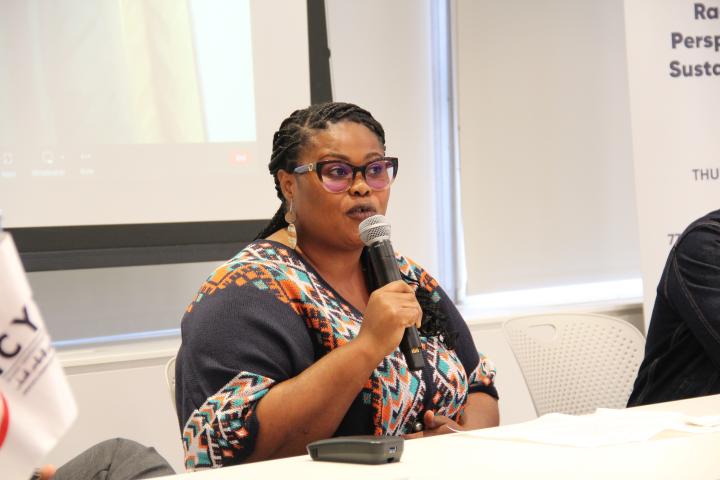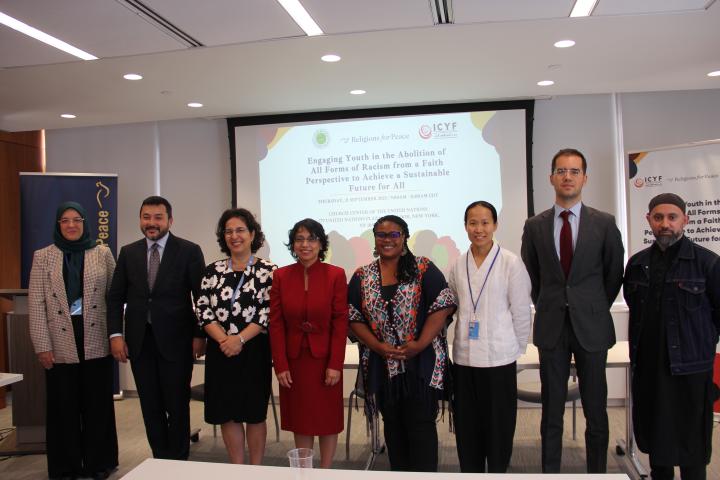Peacebuilding Student Amplifies Voices of Youth within Ghana
December 11, 2023
By Dame Martin

Earlier this fall, Mirian De-Souza, a Hartford International peacebuilding student, spoke at a panel discussion in New York City on “Engaging Youth in the Abolition of All Forms of Racism from a Faith Perspective to Achieve a Sustainable Future for All.” The event was co-organized by Religions for Peace (RfP), the Islamic Cooperation Youth Forum (ICYF) and the International Islamic Fiqh Academy (IIFA), and it was held on the margins of the 78th United Nations General Assembly (UNGA 78).
Mirian has been working with the Ghana Conference of Religions for Peace (GCRP) in New York as their National Youth Coordinator since 2017, in the field of interfaith education and advocacy. She additionally serves as a member of the Religions for Peace International Youth Committee (RfP-IYC). “I amplify the voices of youth within Ghana and the larger African Continent, and it is in this capacity I was invited to speak,” she said.
She wanted to use the panel discussion to tell the story of the frustrations of youth in Ghana and other parts of the African continent who want to secure better opportunities to meet their basic human needs. She discussed two important issues that she has personally experienced.
They are, in Mirian’s own words, as follows:
Tribalism
“There is no doubt racism exists everywhere in our world, but what we experience in Africa, especially in Ghana, is different. Racism in Ghana takes a different form. It is practiced through the lens of ‘Tribalism.’ Speaking with some colleagues from Nigeria and Kenya they confirm this is also the order of the day in their countries.
“Discrimination based on tribal grounds is very common in Africa, and the situation in Ghana has become serious. In terms of getting a job position, in most cases it is not even by your hard work or qualification. It is about whom you know or which tribe you belong to. This can sometimes be easily known just by seeing your last name.
“Some qualified youth who have gone through several years of education and training have been denied jobs and other resources, just because one big man came in with a “protocol list” which outshines other qualified applicants. This I believe should not be the case because it is an impediment to patriotism. This issue of tribalism has affected many spheres of our life as African youth. I know of a few friends who lost national service positions in certain organizations just because they come from a particular region or tribe of the country that the employer or supervisor do not identify with. It has also become common in our political space and has impacted youth and marginalized communities in varied ways.”
Islamophobia
“Ghana as a country is multicultural, multi-ethnic, and multi-religious. Muslims and Christians have long lived in harmony and shared common spaces for years. It is rather unfortunate that we began to experience attacks on Muslim students in some Christian schools in the country. There were instances where Muslim students were prevented from practicing their faith traditions (such as praying, fasting, or wearing of hijab by Muslim girls). They were forced to go to Christian morning prayers. Other students had been denied internship positions simply because they wore a hijab, which is rather unfortunate and a cruel act towards humanity.
“These are some of the issues the Muslim community faces. Although the issues have been resolved [on paper], these unconscious biases still persist. The 1992 Constitution of Ghana still prohibits religious discrimination and gives the right to every individual to practice any religion.”
Hartford International experience
Mirian chose to study at Hartford International in the MA in International Peacebuilding because she is inspired by the multi-faith nature of the program, the long history surrounding it, and the skills and knowledge she can use in her own work.
She wants the youth in Ghana to know that they also can have a role in addressing systemic racism and other intolerances. She adds that these prejudices aren’t always obvious; they can happen when people aren’t even aware. Through inclusion and continuous advocacy she believes true progress can be made. “No individual religion, country, Black or white can resolve the issues of a community,” she said. “This is why it has become important to make this world as inclusive as possible, cutting across all sectors of the economy to ensure we achieve a sustainable future for all.”
Dame Martin is a student at Connecticut Central State University and an intern in HIU's Communications Office.

Join our mailing list
Keep up with all the latest happenings at Hartford International.

